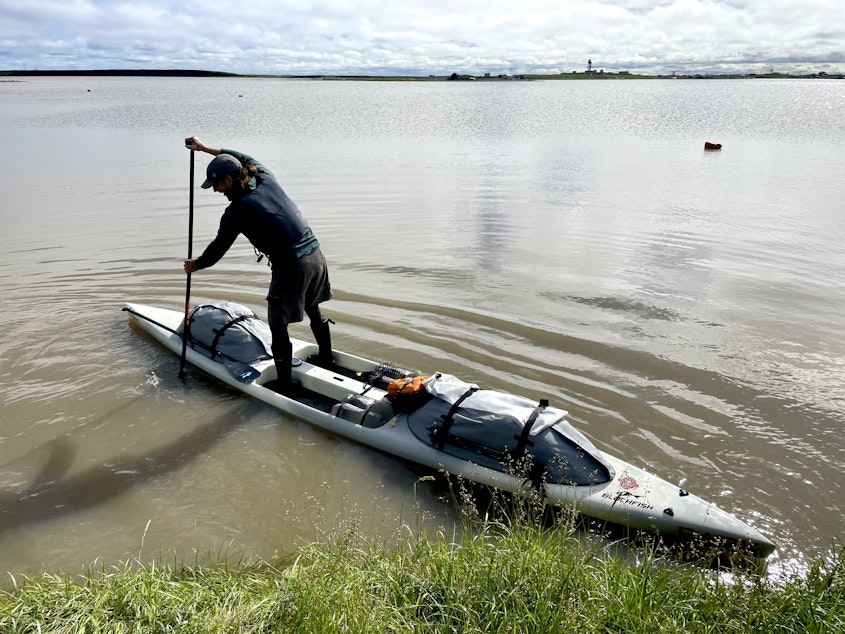Northwest Passage paddleboarder halts trip; has new plan

A Western Washington man who was trying to become the first person to paddleboard across the Northwest Passage has suspended his trip after 15 days on the water. Now he's making a new plan, with lessons learned.
Karl Kruger, 50, of Orcas Island, set off last month to take this Arctic journey via paddleboard through the fabled, but normally frozen, sea route between the Atlantic and the Pacific, which passes over the far north of Canada.
Kruger’s planned route covered 1,900 miles, but he stopped less than a quarter of the way. He said he realized that a single-season passage would be near-impossible.
“I always hesitate to say something is impossible, but it puts it into the realm, very near that,” Kruger said. “It would take a very specific set of conditions for that to be possible. And I think it would need to be a fully supported effort. And it would really take a lot of caloric intake to paddle that many miles, that quickly.”
“It’s pushing too hard to think that you can muscle through the weather — no matter what it is — and keep your caloric intake up, and handle all the other risks too, namely, ice and bears and wildlife and just overall safety and finding fresh water to drink.”
RELATED: Washington adventurer aims to be 1st through Northwest Passage on paddleboard
Kruger paddled nearly 420 miles in 15 days, from Tuktoyaktuk to Paulatuk in the Northwest Territories. Temperatures ranged from the mid-70s to the mid-30s. His longest day was an all-nighter — 16 hours of paddling that took him 72 miles.
“My welcoming committee there was an Inuit hunter named Joe who welcomed me on the beach, to welcome me to Paulatuk, with his 4-wheeler and took me and my board and all my gear on his 4-wheeler, which is a lot of stuff, and gave me a ride to the little hotel there."
Along the way, he learned a few lessons that will inform his next endeavors. Kruger started the journey weighing 190 pounds. When he paddled into Paulatuk, he weighed in at 173 pounds. Future journeys will require more calories. The water he carries with him weighs about 50 pounds. His food, shotgun, an other gear are about 150 pounds. So modifications will be made.
Kruger says he has a new plan. He will spread the Northwest Passage paddle over two or three more summers. Next year, he will start where he left off and paddle from Paulatuk to Kugluktuk. Then Kugluktuk to Cambridge Bay, and on to Gjoa Haven. The final year will be from Gjoa Haven to Pond Inlet.
The experienced extreme paddleboarder says his motivations include personal challenge, but also to draw attention to how Inuit lifeways and the Arctic environment are changing. That informs another lesson he learned this season — he needs to slow down, or he'll miss a lot.
“Just have boots on the ground and meet people and learn as much as I possibly can about the changing Inuit relationship with their land, and also climate change in the Arctic.”
“The closer I got to Paulatuk, the more hunters and fisherman I saw out on the water. And that is the talk in town — who got what duck, who got a beluga, who is going out for caribou this weekend."

